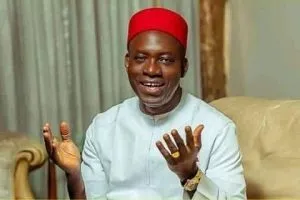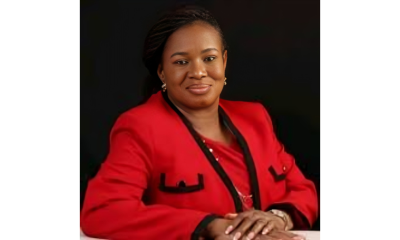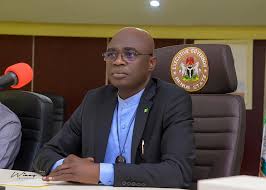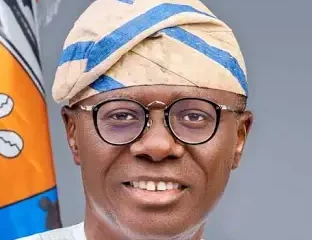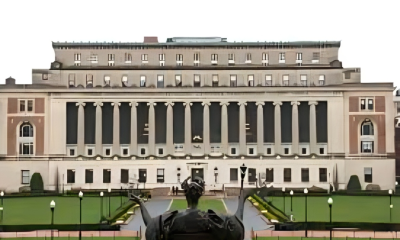OPINION
Musings On Atiku’s “Aluta” Career

By Tunde Olusunle
Permit me to commence by recommending the publication titled: Atiku: The Story of Atiku Abubakar to those with peripheral understanding of Nigeria’s charismatic former Vice President who was deputy to Olusegun Obasanjo. There’s been quantum misrepresentation underscored by plain political mischief, debauchery and chicanery in the public sphere, about the man.
The book under reference was authored by Onukaba Adinoyi-Ojo, one of Nigeria’s finest journalists and writers in his time, who, very sadly and tragically departed in year 2017. Onukaba had the distinction of having authored full length, painstakingly researched and brilliantly rendered biographies on Olusegun Obasanjo, Nigeria’s former military Head of State and later, democratically elected President, and Atiku. The 338-page book on Atiku was published in 2006. It remains a key reference document on Atiku whose name has been a recurring decimal in national politics in the last four decades.We are generally cognisant of developments in our most recent political experience. The phenomenal failure of the preceding administration of Muhammadu Buhari could only have negatively impacted the fortunes of his aspiring successor flying the flag of his party, the All Progressives Congress, (APC), at the presidential poll. A rehash of the failings and faltering of Buhari who contested twice on the springboard of the APC, evokes palpable sighs, teary emotions, even gnashing of teeth. Those years of the locusts are best shifted to the depths of distant memory. The song and slogan on the streets encapsulated mass discontent and a steely determination to excoriate that regime which typified hunger, anger, poverty, insensitivity, insecurity and gloom in totality. Nigerians were poised to speak, loud and very clear with their voter’s cards at the polls.
https://googleads.g.doubleclick.net/pagead/ads?client=ca-pub-5006750317449676&output=html&h=280&adk=1043486309&adf=3897007571&pi=t.aa~a.829776362~i.7~rp.4&w=640&fwrn=4&fwrnh=100&lmt=1696526371&num_ads=1&rafmt=1&armr=3&sem=mc&pwprc=1888619928&ad_type=text_image&format=640×280&url=https%3A%2F%2Fwww.theconclaveng.com%2Fmusings-on-atikus-aluta-career-by-tunde-olusunle%2F&fwr=0&pra=3&rh=160&rw=640&rpe=1&resp_fmts=3&wgl=1&fa=27&uach=WyJtYWNPUyIsIjEwLjEyLjYiLCJ4ODYiLCIiLCIxMDMuMC41MDYwLjEzNCIsW10sMCxudWxsLCI2NCIsW1siLk5vdC9BKUJyYW5kIiwiOTkuMC4wLjAiXSxbIkdvb2dsZSBDaHJvbWUiLCIxMDMuMC41MDYwLjEzNCJdLFsiQ2hyb21pdW0iLCIxMDMuMC41MDYwLjEzNCJdXSwwXQ..&dt=1696526384414&bpp=3&bdt=4980&idt=-M&shv=r20231003&mjsv=m202309291101&ptt=9&saldr=aa&abxe=1&cookie=ID%3D184b35e4898629fb-2271e0db2bd600a6%3AT%3D1666303197%3ART%3D1696526297%3AS%3DALNI_MYi9T9836F1brugYz8KPX97bQIsdQ&gpic=UID%3D00000888cbe43609%3AT%3D1666303197%3ART%3D1696526297%3AS%3DALNI_MbwhRoBlW2rt-Y6x20Vtr8NOmPj7w&prev_fmts=0x0&nras=2&correlator=5903563761857&frm=20&pv=1&ga_vid=1503518805.1666303196&ga_sid=1696526383&ga_hid=162706358&ga_fc=1&u_tz=60&u_his=4&u_h=800&u_w=1280&u_ah=740&u_aw=1280&u_cd=24&u_sd=1&dmc=4&adx=16&ady=1551&biw=1012&bih=642&scr_x=0&scr_y=224&eid=44759875%2C44759926%2C44759837%2C42532403%2C44803793%2C44804173&oid=2&pvsid=3283875527416332&tmod=1600803226&uas=3&nvt=1&ref=https%3A%2F%2Fwww.theconclaveng.com%2Fcategory%2Fopinion%2F&fc=1408&brdim=0%2C41%2C0%2C41%2C1280%2C23%2C1027%2C721%2C1027%2C642&vis=1&rsz=%7C%7Cs%7C&abl=NS&fu=128&bc=31&ifi=2&uci=a!2&btvi=1&fsb=1&xpc=dhhy1FbRVi&p=https%3A//www.theconclaveng.com&dtd=37
The APC superstructure, however, resorted to what the unforgettable Fela Anikulapo-Kuti, revered as precursor of Afrobeat, described as “government magic,” in one of his trademark political compositions. “White was turned into blue, red transformed into green,” as Fela’s song continues. Technological innovations acquired by INEC for humongous sums at the collective expense of taxpayers to facilitate seamsless electoral processes, were summarily dumped in the sewers. Returning officers of opposition parties were bludgeoned, ballot boxes grabbed, tallying sheets mutilated and voter figures presumably fiddled with. INEC in the wee hours of Wednesday March 1, 2023, announced a presidential result when votes were still being added together. Mahmood Yakubu, Chairman of INEC, proclaimed results which didn’t send Nigerians to the streets in freestyle jubilation. Conversely, Nigeria was swaddled by cemetery-type quiet and has remained so ever since.
https://googleads.g.doubleclick.net/pagead/ads?client=ca-pub-5006750317449676&output=html&h=280&adk=1043486309&adf=2029907132&pi=t.aa~a.829776362~i.9~rp.4&w=640&fwrn=4&fwrnh=100&lmt=1696526371&num_ads=1&rafmt=1&armr=3&sem=mc&pwprc=1888619928&ad_type=text_image&format=640×280&url=https%3A%2F%2Fwww.theconclaveng.com%2Fmusings-on-atikus-aluta-career-by-tunde-olusunle%2F&fwr=0&pra=3&rh=160&rw=640&rpe=1&resp_fmts=3&wgl=1&fa=27&uach=WyJtYWNPUyIsIjEwLjEyLjYiLCJ4ODYiLCIiLCIxMDMuMC41MDYwLjEzNCIsW10sMCxudWxsLCI2NCIsW1siLk5vdC9BKUJyYW5kIiwiOTkuMC4wLjAiXSxbIkdvb2dsZSBDaHJvbWUiLCIxMDMuMC41MDYwLjEzNCJdLFsiQ2hyb21pdW0iLCIxMDMuMC41MDYwLjEzNCJdXSwwXQ..&dt=1696526384414&bpp=2&bdt=4980&idt=2&shv=r20231003&mjsv=m202309291101&ptt=9&saldr=aa&abxe=1&cookie=ID%3D184b35e4898629fb-2271e0db2bd600a6%3AT%3D1666303197%3ART%3D1696526297%3AS%3DALNI_MYi9T9836F1brugYz8KPX97bQIsdQ&gpic=UID%3D00000888cbe43609%3AT%3D1666303197%3ART%3D1696526297%3AS%3DALNI_MbwhRoBlW2rt-Y6x20Vtr8NOmPj7w&prev_fmts=0x0%2C640x280&nras=3&correlator=5903563761857&frm=20&pv=1&ga_vid=1503518805.1666303196&ga_sid=1696526383&ga_hid=162706358&ga_fc=1&u_tz=60&u_his=4&u_h=800&u_w=1280&u_ah=740&u_aw=1280&u_cd=24&u_sd=1&dmc=4&adx=16&ady=2170&biw=1012&bih=642&scr_x=0&scr_y=224&eid=44759875%2C44759926%2C44759837%2C42532403%2C44803793%2C44804173&oid=2&pvsid=3283875527416332&tmod=1600803226&uas=3&nvt=1&ref=https%3A%2F%2Fwww.theconclaveng.com%2Fcategory%2Fopinion%2F&fc=1408&brdim=0%2C41%2C0%2C41%2C1280%2C23%2C1027%2C721%2C1027%2C642&vis=1&rsz=%7C%7Cs%7C&abl=NS&fu=128&bc=31&ifi=3&uci=a!3&btvi=2&fsb=1&xpc=D2hIxbBl4B&p=https%3A//www.theconclaveng.com&dtd=150
In his continuing quest to ensure strict adherence to the rule of law in a democracy, Atiku immediately approached the highest court in the land, the Supreme Court, to take another look at the suspect and hazy pronouncements of the PEPT. Side by side with this, Atiku, a veteran and hero of many struggles, stretched the net of his fishing expedition. The question of document adulteration, forgery and scamming has recurred in instances over time since the early months of the running republic. The very first Speaker of the House of Representatives back in 1999, Salisu Buhari, was forced to resign over allegations of certificate forgery. He had tendered a fake certificate from the “University of Toronto” in his quest for a seat in the lower parliament.
The first finance minister under Buhari, Kemi Adeosun, voluntarily resigned from office in 2018. Questions were raised about the authenticity of the certificate issued to her upon the completion of the mandatory one-year National Youth Service Corps, (NYSC). A quintessential omoluabi, the well groomed and well mannered within the Yoruba context, she quietly exited and moved on. She refused to be sucked in by the razzmatazz of Nigerian-style public office, where aides fall over themselves handling all manner of chores for the “oga at the top,” a phrase which became familiar years back. Adeosun demonstrated un-Nigerian grit to have chosen the path she did, despite serving under a President, Buhari, who himself could not present his “ordinary level school certificate” usually issued by the West African Examinations Council, (WAEC).
https://googleads.g.doubleclick.net/pagead/ads?client=ca-pub-5006750317449676&output=html&h=280&adk=1043486309&adf=1388620496&pi=t.aa~a.829776362~i.13~rp.4&w=640&fwrn=4&fwrnh=100&lmt=1696526371&num_ads=1&rafmt=1&armr=3&sem=mc&pwprc=1888619928&ad_type=text_image&format=640×280&url=https%3A%2F%2Fwww.theconclaveng.com%2Fmusings-on-atikus-aluta-career-by-tunde-olusunle%2F&fwr=0&pra=3&rh=160&rw=640&rpe=1&resp_fmts=3&wgl=1&fa=27&uach=WyJtYWNPUyIsIjEwLjEyLjYiLCJ4ODYiLCIiLCIxMDMuMC41MDYwLjEzNCIsW10sMCxudWxsLCI2NCIsW1siLk5vdC9BKUJyYW5kIiwiOTkuMC4wLjAiXSxbIkdvb2dsZSBDaHJvbWUiLCIxMDMuMC41MDYwLjEzNCJdLFsiQ2hyb21pdW0iLCIxMDMuMC41MDYwLjEzNCJdXSwwXQ..&dt=1696526384422&bpp=2&bdt=6991&idt=2&shv=r20231003&mjsv=m202309291101&ptt=9&saldr=aa&abxe=1&cookie=ID%3D184b35e4898629fb-2271e0db2bd600a6%3AT%3D1666303197%3ART%3D1696526297%3AS%3DALNI_MYi9T9836F1brugYz8KPX97bQIsdQ&gpic=UID%3D00000888cbe43609%3AT%3D1666303197%3ART%3D1696526297%3AS%3DALNI_MbwhRoBlW2rt-Y6x20Vtr8NOmPj7w&prev_fmts=0x0%2C640x280%2C640x280%2C300x250%2C468x60&nras=5&correlator=5903563761857&frm=20&pv=1&ga_vid=1503518805.1666303196&ga_sid=1696526383&ga_hid=162706358&ga_fc=1&u_tz=60&u_his=4&u_h=800&u_w=1280&u_ah=740&u_aw=1280&u_cd=24&u_sd=1&dmc=4&adx=16&ady=3131&biw=1012&bih=642&scr_x=0&scr_y=575&eid=44759875%2C44759926%2C44759837%2C42532403%2C44803793%2C44804173&oid=2&psts=AOrYGsl-ZXJcU26o3MHANRm6zaFOTiej0tca8K2Ru7T0WTK_h9GY2Z25nAq5rFOlo6EBwpOLaMtjyVyeECzFYKxZ&pvsid=3283875527416332&tmod=1600803226&uas=3&nvt=1&ref=https%3A%2F%2Fwww.theconclaveng.com%2Fcategory%2Fopinion%2F&fc=1408&brdim=0%2C41%2C0%2C41%2C1280%2C23%2C1027%2C721%2C1027%2C642&vis=1&rsz=%7C%7Cs%7C&abl=NS&fu=128&bc=31&ifi=4&uci=a!4&btvi=5&fsb=1&xpc=4R6iphiEuj&p=https%3A//www.theconclaveng.com&dtd=M
News out of Chicago State University, (CSU) in the United States, in the inquest into the matter of alleged forgery instituted by Atiku against Tinubu, seems to validate previous presumptions. The President might just have manufactured his certificate. Following from documents submitted to INEC ahead of the presidential election, Tinubu made no entries for his primary and secondary schools, got admitted into the Chicago-based citadel for his tertiary institution and posted a blank section for his NYSC certificate. There is also the controversy about his gender during his studentship in CSU. Was he male or female? It has been virtually confirmed that Tinubu plausibly appropriated the social security number and sex of a female Nigerian student with that identity. The photograph of a lady by the name: “Adenike Abimbola Tinubu” has been trending on the internet in recent days. Tinubu’s frequently used first name, “Bola” is without a prefix or suffix. This is inconsistent with known Yoruba christening patterns. Atiku’s pakute, the Yoruba expression for “trap,” seems to have clapsed Tinubu’s ankle.
https://googleads.g.doubleclick.net/pagead/ads?client=ca-pub-5006750317449676&output=html&h=280&adk=1043486309&adf=64589011&pi=t.aa~a.829776362~i.15~rp.4&w=640&fwrn=4&fwrnh=100&lmt=1696526371&num_ads=1&rafmt=1&armr=3&sem=mc&pwprc=1888619928&ad_type=text_image&format=640×280&url=https%3A%2F%2Fwww.theconclaveng.com%2Fmusings-on-atikus-aluta-career-by-tunde-olusunle%2F&fwr=0&pra=3&rh=160&rw=640&rpe=1&resp_fmts=3&wgl=1&fa=27&uach=WyJtYWNPUyIsIjEwLjEyLjYiLCJ4ODYiLCIiLCIxMDMuMC41MDYwLjEzNCIsW10sMCxudWxsLCI2NCIsW1siLk5vdC9BKUJyYW5kIiwiOTkuMC4wLjAiXSxbIkdvb2dsZSBDaHJvbWUiLCIxMDMuMC41MDYwLjEzNCJdLFsiQ2hyb21pdW0iLCIxMDMuMC41MDYwLjEzNCJdXSwwXQ..&dt=1696526384429&bpp=1&bdt=6998&idt=1&shv=r20231003&mjsv=m202309291101&ptt=9&saldr=aa&abxe=1&cookie=ID%3D184b35e4898629fb-2271e0db2bd600a6%3AT%3D1666303197%3ART%3D1696526297%3AS%3DALNI_MYi9T9836F1brugYz8KPX97bQIsdQ&gpic=UID%3D00000888cbe43609%3AT%3D1666303197%3ART%3D1696526297%3AS%3DALNI_MbwhRoBlW2rt-Y6x20Vtr8NOmPj7w&prev_fmts=0x0%2C640x280%2C640x280%2C300x250%2C468x60%2C640x280&nras=6&correlator=5903563761857&frm=20&pv=1&ga_vid=1503518805.1666303196&ga_sid=1696526383&ga_hid=162706358&ga_fc=1&u_tz=60&u_his=4&u_h=800&u_w=1280&u_ah=740&u_aw=1280&u_cd=24&u_sd=1&dmc=4&adx=16&ady=3803&biw=1012&bih=642&scr_x=0&scr_y=1241&eid=44759875%2C44759926%2C44759837%2C42532403%2C44803793%2C44804173&oid=2&psts=AOrYGsl-ZXJcU26o3MHANRm6zaFOTiej0tca8K2Ru7T0WTK_h9GY2Z25nAq5rFOlo6EBwpOLaMtjyVyeECzFYKxZ&pvsid=3283875527416332&tmod=1600803226&uas=3&nvt=1&ref=https%3A%2F%2Fwww.theconclaveng.com%2Fcategory%2Fopinion%2F&fc=1408&brdim=0%2C41%2C0%2C41%2C1280%2C23%2C1027%2C721%2C1027%2C642&vis=1&rsz=%7C%7Cs%7C&abl=NS&fu=128&bc=31&ifi=5&uci=a!5&btvi=6&fsb=1&xpc=bOKaCQtr2F&p=https%3A//www.theconclaveng.com&dtd=M
Sadly, very tragically sadly, sections of the Nigerian elite are hailing, supporting and serenading Tinubu as the “actor” or “bad guy” in an action movie. He seems to have outwitted his adversaries in the plot of the screenplay, deploying a combination of street smartness and crookedness. He is adulated as the baba’sale, the don of the backwaters, in the storyline. And because the mythical Tinubu is involved in this mire, identity theft and certificate plagiarism are admissible and proper. Some of us have indeed been repeatedly vilified by Tinubu apologists and “e-rats” on the social media. I’ve serially maintained though that he doesn’t equate the values, qualities and standards of archetypal Yoruba forerunners.
The Obafemi Awolowos, Samuel Akintolas, Abraham Adesanyas, Adeniran Ogunsanyas, Lateef Jakandes, Adekunle Ajasins, Bisi Adebanjos, Bola Iges, Reuben Fasorantis, Ayo Adebanjos, Olu Falaes, authentic Yoruba frontiersmen, were substantially transparent and respected. The contemporary Asiwaju, however, might just have been found to be something of a perjurer. His hero-worshippers and cult followers, however, want him profiled simply as a lesser cheat! Reminds of former President Goodluck Jonathan’s uncanny distinction between “stealing” and “corruption!” Tinubu’s choristers are totally blinded to the spiral effects of this national and global embarrassment. The Nigerian President should be largely overboard in many ways.
Like my brother journalist and scholar Tivlumun Nyitse said at a forum, “those who made us believe that they were champions in the pursuit of truth, justice and fair play have suddenly lost their moral compass.” They have turned a blind eye to the discovery of a career impostor who has conned his way to the marketplace as lead performer in the community orchestra. They have spontaneously become the cheerleaders of a certified trickster. They are oblivious of how grievously this development can impact the worldview of the younger generation. Those our generation is frantically attempting to wean off fatalistic subscriptions to cultism, truancy, alcoholism, drugs, and so on, now have a ready-made model. They now know they can get to the very top irrespective of the crookedness of the route they ply.
https://googleads.g.doubleclick.net/pagead/ads?client=ca-pub-5006750317449676&output=html&h=280&adk=1043486309&adf=523693371&pi=t.aa~a.829776362~i.21~rp.4&w=640&fwrn=4&fwrnh=100&lmt=1696526371&num_ads=1&rafmt=1&armr=3&sem=mc&pwprc=1888619928&ad_type=text_image&format=640×280&url=https%3A%2F%2Fwww.theconclaveng.com%2Fmusings-on-atikus-aluta-career-by-tunde-olusunle%2F&fwr=0&pra=3&rh=160&rw=640&rpe=1&resp_fmts=3&wgl=1&fa=27&uach=WyJtYWNPUyIsIjEwLjEyLjYiLCJ4ODYiLCIiLCIxMDMuMC41MDYwLjEzNCIsW10sMCxudWxsLCI2NCIsW1siLk5vdC9BKUJyYW5kIiwiOTkuMC4wLjAiXSxbIkdvb2dsZSBDaHJvbWUiLCIxMDMuMC41MDYwLjEzNCJdLFsiQ2hyb21pdW0iLCIxMDMuMC41MDYwLjEzNCJdXSwwXQ..&dt=1696526384434&bpp=2&bdt=7003&idt=2&shv=r20231003&mjsv=m202309291101&ptt=9&saldr=aa&abxe=1&cookie=ID%3D184b35e4898629fb-2271e0db2bd600a6%3AT%3D1666303197%3ART%3D1696526297%3AS%3DALNI_MYi9T9836F1brugYz8KPX97bQIsdQ&gpic=UID%3D00000888cbe43609%3AT%3D1666303197%3ART%3D1696526297%3AS%3DALNI_MbwhRoBlW2rt-Y6x20Vtr8NOmPj7w&prev_fmts=0x0%2C640x280%2C640x280%2C300x250%2C468x60%2C640x280%2C640x280%2C300x250&nras=8&correlator=5903563761857&frm=20&pv=1&ga_vid=1503518805.1666303196&ga_sid=1696526383&ga_hid=162706358&ga_fc=1&u_tz=60&u_his=4&u_h=800&u_w=1280&u_ah=740&u_aw=1280&u_cd=24&u_sd=1&dmc=4&adx=16&ady=4943&biw=1012&bih=642&scr_x=0&scr_y=2432&eid=44759875%2C44759926%2C44759837%2C42532403%2C44803793%2C44804173&oid=2&psts=AOrYGsl-ZXJcU26o3MHANRm6zaFOTiej0tca8K2Ru7T0WTK_h9GY2Z25nAq5rFOlo6EBwpOLaMtjyVyeECzFYKxZ&pvsid=3283875527416332&tmod=1600803226&uas=3&nvt=1&ref=https%3A%2F%2Fwww.theconclaveng.com%2Fcategory%2Fopinion%2F&fc=1408&brdim=0%2C41%2C0%2C41%2C1280%2C23%2C1027%2C721%2C1027%2C642&vis=1&rsz=%7C%7Cs%7C&abl=NS&fu=128&bc=31&ifi=6&uci=a!6&btvi=8&fsb=1&xpc=xZPkkLCJ5x&p=https%3A//www.theconclaveng.com&dtd=M
Social media reports are already proffering that the qualifications and certifications of some Nigerian professionals abroad will be re-evaluated. Previously, Nigerians across the world, especially in the United States and United Kingdom, always headlined the classifications of the most educated and most qualified professionals, amongst immigrants. As deliberate government policy, Nigeria indeed once exported excess human capacity to needy African and Caribbean countries under the “Technical Aids Corps,” (TAC), initiated by the government of former military President Ibrahim Babangida, three decades ago. We are now susceptible to hurtful taunts by cheeky immigration clerks in Johannesburg and Dubai, asking us for updates about the certificate forgery saga involving our President.
The prescription of popular revisit to the book Atiku: The Story of Atiku Abubakar, stems largely from the need to appreciate the beginnings of Atiku’s activist engagements. His triumph in forensically busting the compounded falsification, forgeries and frauds related to the President’s credentials, is product of longstanding, albeit subtle involvement in popular causes. He served his apprenticeship during his days as a student at the “School of Hygiene” (now known as the School of Health Technology), Kano, and the Institute of Administration of the Ahmadu Bello University, (ABU), Zaria, respectively. He was a student of both institutions between 1966 and 1969. In the former, Atiku’s deft handling of a brewing students’ disquiet earned him election as “President Emeritus!” He was just 20 at the time. While studying for a diploma in law in ABU, he contested for the positions of Assistant Secretary General and Deputy Speaker of the Students’ Union Parliament, concurrently. He won resoundingly. He was targeted for elimination by executioners loyal to former military Head of State, General Sani Abacha in his Kaduna home for his pro-democracy endeavours. These experiences, sharpened his dentition for his modern day enterprise.
https://googleads.g.doubleclick.net/pagead/ads?client=ca-pub-5006750317449676&output=html&h=280&adk=1043486309&adf=3530670673&pi=t.aa~a.829776362~i.25~rp.4&w=640&fwrn=4&fwrnh=100&lmt=1696526371&num_ads=1&rafmt=1&armr=3&sem=mc&pwprc=1888619928&ad_type=text_image&format=640×280&url=https%3A%2F%2Fwww.theconclaveng.com%2Fmusings-on-atikus-aluta-career-by-tunde-olusunle%2F&fwr=0&pra=3&rh=160&rw=640&rpe=1&resp_fmts=3&wgl=1&fa=27&uach=WyJtYWNPUyIsIjEwLjEyLjYiLCJ4ODYiLCIiLCIxMDMuMC41MDYwLjEzNCIsW10sMCxudWxsLCI2NCIsW1siLk5vdC9BKUJyYW5kIiwiOTkuMC4wLjAiXSxbIkdvb2dsZSBDaHJvbWUiLCIxMDMuMC41MDYwLjEzNCJdLFsiQ2hyb21pdW0iLCIxMDMuMC41MDYwLjEzNCJdXSwwXQ..&dt=1696526384440&bpp=1&bdt=7009&idt=1&shv=r20231003&mjsv=m202309291101&ptt=9&saldr=aa&abxe=1&cookie=ID%3D184b35e4898629fb-2271e0db2bd600a6%3AT%3D1666303197%3ART%3D1696526297%3AS%3DALNI_MYi9T9836F1brugYz8KPX97bQIsdQ&gpic=UID%3D00000888cbe43609%3AT%3D1666303197%3ART%3D1696526297%3AS%3DALNI_MbwhRoBlW2rt-Y6x20Vtr8NOmPj7w&prev_fmts=0x0%2C640x280%2C640x280%2C300x250%2C468x60%2C640x280%2C640x280%2C300x250%2C640x280&nras=9&correlator=5903563761857&frm=20&pv=1&ga_vid=1503518805.1666303196&ga_sid=1696526383&ga_hid=162706358&ga_fc=1&u_tz=60&u_his=4&u_h=800&u_w=1280&u_ah=740&u_aw=1280&u_cd=24&u_sd=1&dmc=4&adx=16&ady=5954&biw=1012&bih=642&scr_x=0&scr_y=3398&eid=44759875%2C44759926%2C44759837%2C42532403%2C44803793%2C44804173&oid=2&psts=AOrYGsl-ZXJcU26o3MHANRm6zaFOTiej0tca8K2Ru7T0WTK_h9GY2Z25nAq5rFOlo6EBwpOLaMtjyVyeECzFYKxZ&pvsid=3283875527416332&tmod=1600803226&uas=1&nvt=1&ref=https%3A%2F%2Fwww.theconclaveng.com%2Fcategory%2Fopinion%2F&fc=1408&brdim=0%2C41%2C0%2C41%2C1280%2C23%2C1027%2C721%2C1027%2C642&vis=1&rsz=%7C%7Cs%7C&abl=NS&fu=128&bc=31&ifi=7&uci=a!7&btvi=9&fsb=1&xpc=LfUQhC0bVZ&p=https%3A//www.theconclaveng.com&dtd=M
Atiku’s battles and travails to salvage the Office of the Vice President from immolation by an overbearing President, and the political process from crass impunity by the political class, are properly documented. He pursued many of his misgivings all the way to the Supreme Court and succeeded. Osita Chidoka, a former aviation minister and Farooq Kperogi, a respected US-based Nigerian professor and public scholar have in recent treatises correctly canvassed acclamation for Atiku. His perspiration in helping Nigerians and the global community unravel the “masked man,” (not Lagbaja the masked artiste in this case), who has been our President since May 29, 2023 has paid off handsomely. Atiku invested uncommon ruggedness and peerless activism in the eventual unearthing of the fossils of Nigeria’s Number One Citizen’s cloudy, dodgy, even greasy credentials. Not too many previously knew the aluta component of the overall makeup of the typically calm and calculating Atiku.
The ball at this point, is squarely and effectively in the court of the man so openly disrobed, of Nigerians at large and the judiciary.
● Tunde Olusunle, PhD, poet, journalist, scholar, and author, is a member of the Nigerian Guild of Editors, (NGE).
OPINION
Reforms, Reluctant Reformers and Bold Reforms
By Uddin Ifeanyi
The incumbent Federal Government is wont to make a song and dance of its reform credentials. Of late, it has been all about how smitten the international community is by these reforms – never mind that a growing domestic cohort chafes at them.Most other times, government’s spokespersons advert attention to how brave the Tinubu administration was to roll back the subsidy schemes in both the foreign exchange and domestic petrol markets.
Against the backdrop of the pussyfooting by its predecessors around both these reforms, the Tinubu government’s shills make a persuasive case. History, however, has more than one way of being explained. Its consequences, not so. In the case of the Tinubu government’s storytelling around its two most important market-based reforms, one indubitable consequence of the failure of previous governments to deal with financial leakages in the foreign exchange and downstream oil and gas sectors of the economy was that the exchequer had haemorrhaged to the point of severe anaemia when this government came into power.It is doubtful if the Tinubu administration could have carried on business as usual in these sectors without beaching the ship of state. Did the government, then, act from the courage of its convictions? No. More like captives of circumstances would. This reading is reinforced by the government’s subsequent reform failures. Assume, for the sake of argument, that the recourse to market-based reforms was in recognition of the need to properly price domestic transactions as part of the effort to ensure the efficient use of domestic resources. Is there a more necessary requirement for meeting this objective than reforms that improve the efficiency of the state?Unlikely. But the incumbent Federal Government has done nothing to address a state that is generally acknowledged to be too bloated, both for its own good and for the benefit of the economy that it is there to serve. The Oronsaye Report may no longer be as easily applicable as a reform initiative as when it was first released. But this is only because the Tinubu government has increased the state’s capacity, without notably making it more efficient. In administration, as in philosophy, the simplification of entities is a far more compelling case for the efficient generation, deployment, and use of increasingly scarce resources than their multiplication.If the administration then fails in its own reasoning, in so far as reforms to the organisation of the state is concerned, it can hardly be described as bold in its execution, either. Nowhere is this latter failing more glaring than in our administration of criminal justice. If the Nigeria Police Force daily fails the test of public opprobrium, the judiciary scarcely paints itself in glowing colours either.Yet, both are critical for an efficient market economy. The Americans still use cheques for their financial transactions. We cannot. And this is not because we have a far more sophisticated financial services space. True, settlements of banking transactions take place faster, here.True, we also have statutes against the issuance of dud cheques. But enforcement of any law, rule or regulation is a nightmare, here. Banks struggle to recover collaterals pledged for loans. Small wonder that we do not have a thriving mortgage space? The trust deficit has far-reaching implications, unfortunately. With it, contracts cannot be freely entered into. And yet, we are still to see reforms to our criminal justice system from our bold advocates.No less important, the state’s capacity to properly regulate the private sector is still in doubt. This is as much a case of regulatory capture as it is a worry about competence. Capture is worrisome, especially when private entities compromise a regulator. But its effects are no less harmful when industry is influenced and controlled by the arm of the state set up to regulate it. Either way, economic vibrancy is lost. And with it all prospects of attracting investments – whether of a local or foreign variety.Thankfully, there is still just about enough time and space for some of the reforms that the economy needs. The fear is that protestations to the contrary aside, we still suffer a severe shortage of the cojones needed to see these reforms through.Uddin Ifeanyi, journalist manqué and retired civil servant, can be reached @IfeanyiUddin.OPINION
Electoral Reform: INEC, Citizens’ Proposals, and the Implications for 2027

By Samson Itodo
Nigeria’s 2027 elections, now just 21 months away, may be regulated by a new electoral law, possibly the Electoral Act 2025, as long as the National Assembly concludes the ongoing amendment process and the President grants assent to the bill this year.Therefore, the next few months will be determinative.
Debates on electoral reforms and proposed amendments to key sections of the Election Act 2022 and Constitution will dominate public discourse. As the momentum of the 2027 election gathers steam, politicians are becoming more invested in tweaking the rules of the game to guarantee electoral victory in 2027 rather than ensuring electoral reform proposals address the intractable challenges bedevilling Nigeria’s electoral process.Foremost among these challenges is the declining public trust in the electoral process due to election manipulation. Also, ‘captured’ democratic institutions, like INEC and the judiciary, are encumbered by persistent political interference and lastly, policies and practices that disenfranchise eligible citizens from voting.INEC’s Proposals for Electoral ReformINEC has officially highlighted its proposals for electoral reform in the current electoral cycle. These include four major constitutional amendments cutting across 16 sections of the 1999 constitution (As Amended). The proposals include the introduction of early voting and special voting to allow eligible voters on essential services to vote at elections. This includes election officials, security personnel, accredited journalists and election observers, as well as voters under incarceration and Nigeria living in the diaspora. This reform will ensure eligible voters are not disenfranchised as a result of their role in elections or location. To enhance the independence of the Commission, INEC is proposing the removal of the powers to appoint Resident Electoral Commissioners (RECs) from the President and vest the power in INEC. This amendment would empower INEC to appoint and discipline Heads of State Offices, FCT Offices, and State Directors of Elections. Furthermore, INEC is advocating for the establishment an Electoral OffencesCommission and a Political Party Regulatory Agency. To advance political inclusion, INEC recommends the creation of designated constituencies for women and persons with disabilities.In relation to the 2022 Electoral Act, INEC is advocating for amendments to 35 sections. Notable amongst the proposals include removing the ambiguities in the result management process, particularly the ambiguity in the words ‘transfer’ and ‘direct transmission’ of election results used in Sections 60(5) and 64(4 and 5) of the Electoral Act, which in the estimation of the Commission has resulted in conflicting interpretation.Another significant proposal is the introduction of a caveat to limit INEC’s power to review election results solely to cases of declaration of results under duress. Finally, INEC proposes the introduction of electronically downloadable voter cards or any other form of identification acceptable to the Commission for voter accreditation. This would enhance voter participation and reduce barriers to participation, especially where the physical distribution of Permanent Voter Cards (PVCs) has proven challenging.Citizens’ Demands for Electoral ReformFollowing extensive consultations and a review of both domestic and international election observation recommendations, civil society groups released a Citizens’ Memorandum on Electoral Reform (2024). The memorandum outlines 37 recommendations under 15 strategic objectives across 15 priority reform areas.A key citizen demand is strengthening INEC’s independence and professionalism. To achieve this, the power vested in the President to appoint the Chairman, National Commissioners, and RECs should be removed and a multi-stakeholder appointment mechanism adopted.This will ensure appointment to INEC are merit-based appointments and devoid of political interference. The constitutional criteria of “non-partisanship and unquestionable character” should be expanded to include professional qualifications, health status, age, and gender.The introduction of mandatory timelines for appointments into INEC, such as requiring vacancies to be filled within 30 days, is recommended. It will prevent unwarranted delays in constituting the Commission as witnessed in the current instance where the second National Commissioner position for the South East vacated by Barr. Festus Okoye, two years ago, remains unfilled.Another significant demand is the resolution of pre- and post-election disputes before the swearing-in of elected officials. This amendment will enhance the legitimacy and stability of the electoral process. Achieving this will require revising election timelines as well as abridging the timeframe for hearing and determining pre-election matters and election petitions.The citizen memo also advocates for mandatory electronic transmission of results and legal timelines for testing electoral technologies deployed by INEC. These steps are crucial to improving transparency of any part of the electoral powered by technology. To enhance voter turnout, the memorandum proposes a review of the requirements for voter identification to permit the use of other legally acceptable means of identification for voter verification in addition to Permanent Voters’ Cards (PVCs).Lastly, early voting is proposed to accommodate election officials and voters delivering essential services on election day such as security personnel, journalists, and accredited observers. This reform would ensure these critical actors are not disenfranchised due to their responsibilities on election day.Implications for the 2027 ElectionsWhile President’s Tinubu electoral reform agenda remains unclear, the National Assembly, through its joint committee on electoral reform, has made significant progress in the review of electoral laws. Four critical priorities emerge from INEC’s proposals and citizens demands:First, there is a great need to introduce special mechanisms to uphold citizens’ right to vote by making voting accessible. Proposals like early/special voting will enable historically marginalized eligible voters exercise their franchise. It will be historic for INEC officials, inmates, Nigerians in the diaspora, and others to cast their ballot in 2027 due to early/special voting. Alternative forms of identification and downloadable voter cards could address voter disenfranchisement resulting from the non-issuance of PVCs.Secondly, the election results management regime needs an overhaul. Certain ambiguities in the current electoral act that occasion misinterpretation and discretionary enforcement need to be resolved to clear procedures for collation and transmission.This should include compulsory electronic transmission to complement the manual collation process. Although the Supreme Court has ruled that the INEC IReV is not part of the collation process, this reform cycle presents an opportunity to integrate electronic transmission into the results collation process. Unfortunately, electronic transmission has not featured as a priority reform issue in the current reform process in the National Assembly.Thirdly, INEC’s independence is non-negotiable. There is growing consensus that divesting the power to appoint individuals from the President is a step towards recapturing the Commission and restoring public confidence. Lastly, concluding election disputes before swearing-in will create a sense of equity and prevent incumbents from influencing judicial outcomes using state resources and power.However, INEC’s proposal that its power to review election results under Section 65 Electoral Act 2022 should be limited to instances of declaration by duress is problematic. The current law provides two conditions for the exercise of this power: when election results are declared voluntarily and when election results are declared contrary to the provisions of the law, regulations and guidelines, and manual for the election. INEC’s proposal to eliminate the latter will further weaken the results management process, considering recent elections where elections were stolen through clear violations of the Electoral Act and INEC guidelines. Rather than limit the conditions, the current provision should be retained and strengthened to provide clarity on the procedure for activating the power to review election results.As Nigeria enters a critical period in the electoral reform cycle, history beckons the national assembly and the President to act as statesmen and women by prioritizing public interests above personal or partisan political gain. The country’s electoral process is bleeding and bereft of public trust. While electoral amendments are a pathway to rebuilding trust and safeguarding the credibility of the 2027 elections, attitudinal change among political elites is the reform most needed to ensure every vote counts in February 2027.Samson Itodo is an election, democracy, and public policy enthusiast. Itodo serves as the Executive Director of Yiaga Africa and Principal Partner of the Election Law Center. He is also a member of the Kofi Annan Foundation board and the Board of Advisers of International Institute for Democracy and Electoral Assistance (IDEA). Comments and feedback to sitodo@yiaga.org
OPINION
Western Powers: On the Prowl to Neutralise Ibrahim Traore
By Ahmed Aminu-Ramatu Yusuf
Africans and progressive activists in the continent and the diaspora, including the United States (US), Canada, the Caribbean, Western Europe, and Russia, took to the streets on 30 April.The marches were in support and solidarity with the President of Burkina Faso, Captain Ibrahim Traore, his government and the people.
They were joined by democratic, anti-imperialist, and peace-loving peoples of other races. The protest was triggered by the continuous destabilisation of Burkina Faso by Western powers, especially France, which has been financing and arming some extremely retrograde and deadly terrorist elements of the Boko Haram type.But, why are France and Western powers so desperate to eliminate Traore and overthrow his government?What are French military warships, carrying hundreds of troops, helicopters, and military vehicles doing in neighbouring but hostile Cote d’Ivoire, three months after the latter claim to have expelled French forces?Why did the U.S African-American General, Michael Langley, tell a U.S. Senate Hearing that Burkina Faso’s gold reserve goes for Traore’s personal security rather than the nation’s benefit? So the US said of Muammar Gaddafi before destroying Libya and killing Gaddafi.The first reason is that Burkina Faso is a largely driven agriculture and mining country. It produces gold zinc, copper, manganese, phosphate and limestone. But it has significant reserves of diamonds, bauxite, vanadium and nickel, etc., which are presently unexploited.These materials, hitherto exploited by Western multinationals, have been nationalized by Traore’s government. An act generally seen by the Western powers as dangerous to their interests.Secondly, Traore is widely seen as the political reincarnation of a predecessor, Captain Thomas Sankara, assassinated by a French marionette, Blaise Compaore, in 1987. Like Sankara, he rode to power, as a Captain, through military coup d’état, in his early thirties. Sankara at the age of thirty-three, Traore at thirty-four.Both fought commendably against Western-backed terrorists operating and destabilizing Burkina Faso. Like Sankara, Traore is a nationalist, patriot, and professional but politically conscious military officer.Both are people-oriented leaders, passionately committed to the defence of the homeland, and the all-round development of Burkina Faso.To Western powers, a Sankara born-again must not be allowed to shine, flower and flourish, as it will fertilize the grounds for the reincarnation of African leaders like Patrice Lumumba of Congo, Sylvanus Olympio of Togo, Kwame Nkrumah of Ghana, Amilcar Cabral of Guinea Bissau & Cape Verde, Augustino Neto of Angola, Samora Machel of Mozambique, Gadhafi of Libya, Robert Mugabe of Zimbabwe and, Steve Biko, Robert Sobukwe, and Chris Hani of South Africa.Thirdly, Western powers are opposed to Traore because he is a strong believer and practitioner of development. Like Cabral, Traore sees development as greatly involving but radically transcending modernisation. Development, to them, means improving their citizens’ material, spiritual, welfare, and security conditions; continuously ensuring peace and progress; increasingly humanizing their citizens’ lives and conditions and, guaranteeing the future of their children.From the Western powers perspective, such development will negatively affect their economic interests, and counter their political domination.To Traore, pursuing development means simultaneously continuing the independence struggle to its logical conclusion. This informs his stand that, “[w]e are not in a democracy, we are in a revolution”, as the struggle involves breaking “every tie that kept us in slavery.”Fourthly, the reality, however, is that Traore believes in democracy. But democracy, to him, is more than the principles, ingredients, and rituals of liberal democracy. By his words and actions, he is out to create the basis for practicing popular democracy.After all, as Cabral said, “the people are not fighting for ideas, for the things in anyone’s head. They are fighting for material benefits, to live better and in peace,… ” Fredrick Engels had earlier said the same thing, that, “[m]ankind must first of all eat, have shelter and clothing before he can pursue politics.. . ”Popular democracy is a democracy that involves the masses in the administration of the state, the society and the economy; meets their ever-expanding material, spiritual and cultural requirements and, addresses the contradictions within the people.It is equally directed towards restricting the powers of the ruling and governing classes; confronting the dominance of Western imperialist forces in the country; consolidating national independence; transforming the neo-colonial economy; and enthroning the working people in the affairs of the political economy.Popular democracy, therefore, is a democracy in which the masses of people are dominant, and in which their interests and well-being supersedes, and overrides, the powerful interests of externally forces. As Traore said, “We have been receiving French aid for 63 years, yet our country has not developed, so cutting it off from us now will not kill us, but motivate us to work and rely on ourselves.”Fifthly, Traore is a Pan-Africanist. Like Nkrumah, he believes in the unity of Africans. But he is equally conscious that Pan-Africanism can never be attained if the African masses are relegated to the background. Therefore, the major task of Pan-Africanist leaders is to create the favourable conditions for the attainment of the ideals of Pan-Africanism.Traore believes that while Burkina Faso comes first, its development and liberation is dialectically connected with Africa’s development and liberation.Together with General Abdourahamane Tchiani of Niger Republic, and General d’Armee Goita of Mali, Traore established the Alliance of Sahel States (AES), to counter the hostilities of the pro-West Economic Community of West African States (ECOWAS).AES is confronting Western sponsored terrorism and economic sanctions. Members have adopted concrete measures to neutralise France control over their natural resources, political and diplomatic affairs, as well as economic and trade relations. They have withdrawn from the International Organisations of Francophone States, and downgraded French language in their countries.AES members have stopped French military operations in, and expelled French military forces from, their countries. They have renamed their streets after their national heroes and heroines, as against the names of racist and fascist colonial rulers.Sixth, Traore embarked on projects that undermine the interests of French and Western forces in Burkina Faso. Within two years, local and foreign debts, including those of IMF and World Bank, have been paid. He has embarked on agricultural mechanisation, and the industrialisation of the country. All these, amongst others, are economically injurious to Western interests, as they drastically cut their monopolistic capital accumulation.But these progressive actions equally endanger Traore. Alhaji Waziri Ibrahim, Nigeria’s Minister of Economic Planning, warned Africa as far back as November 1961, that: “…if we want to go very quickly in our economic changes, we cannot easily do it without creating a certain amount of trouble … The imperialists have got various means to defending their monopoly. They have got their newspapers and televisions and they can go to any extent to tell lies. If we want to set about improving the economy of our country in a particular way, they may say we are Communists. They can make our countrymen suspect our every move. If they do not succeed by false propaganda, by calling us all sorts of names, if they fail to make us unpopular in order to win their case, they can arrange assassination. They can go to any extent without discrimination.”
Ride on Traore. But, just as Samora Machel said, “[t]he day you hear the Whites speak of me in good terms, … I have betrayed you already” So Traore, please, know the day France and other Western powers speak good of you, that day, we, Africans in Africa and in the Diaspora, will know you have sold out to Western imperialist forces.Ahmed Aminu-Ramatu Yusuf worked as deputy director, Cabinet Affairs Office, The Presidency, and retired as General Manager (Administration), Nigerian Meteorological Agency, (NiMet). Email: aaramatuyusuf@yahoo.com



